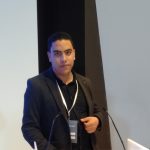On April 25, Al-Hoceima Court in north Morocco issued a four-year prison sentence against one of the figureheads of Hirak Al-Rif, Rabih Al-Ablaq, convicting him of “disrespecting the king.” Al-Ablaq had shared posts and videos on Facebook that criticized King Mohammed VI.
In a similar case, the First Court in Casablanca sentenced poet and blogger Saida Al-Alami to two years in prison on April 29, on several charges including “insulting public officials while carrying out their duties with statements that disrespect their authority” through her Facebook posts.
Al-Alami and Al-Ablaq’s lawyer, Souad Brahma, told SMEX that “these trials are unfair because they fall under the freedom of opinion, expression and the press — freedoms protected by the law and the constitution.” She added that “they are not supposed to fall within the framework of the Penal Code which was used to punish Al-Ablaq and Al-Alami.”
Law Circumvention
Moroccan authorities usually resort to the Penal Code to punish opposition journalists and bloggers for criticizing some influential figures and institutions on social media. This is what Mohamed Ziane, former head of the Bar and Moroccan Human Rights Minister, considers “circumventing the law and the constitution.”
Ziane explains to SMEX that “In case of judicial prosecutions against journalists and bloggers for their writings, Law No. 88.23 on publishing and the press should be the primary reference.”
According to Ziane, “the Penal Code is used to clamp down on bloggers and journalists, in clear contravention of jurisdiction rule.” At the same time, Moroccan authorities boast to the international community about the 2016 Press and Publication Law for not including any prison sentences—only monetary fines.
Ziane affirms that “complaints about material published in newspapers and on blogs and social media—excluding cases related to the incitement to murder and the dissemination of hate speech—must be addressed by the Press and Publishing Law.”
“Peaceful criticism of public officials is protected by the constitution and the International Covenant on Civil and Political Rights, which was endorsed by Morocco in 1979,” as underlined by Brahma. However, applying the Penal Code to punish dissent in writing, instead of applying the Press and Publication Law, “creates a sense of terror among journalists and bloggers and leads them self-censorship.”
Crackdown on online bloggers and journalists
Brahma explains that freedom of blogging and expression has become more restricted in Morocco, due to the heavy charges against bloggers and activists who peacefully expressed critical opinions via social media posts.
On July 15, 2021, Noureddine El-Aouaj, a human rights activist and blogger, was arrested while participating in a protest in support of journalists Soulaimane Raissouni and Omar Radi in front of the Casablanca Appeal Court. El-Aouaj was accused of “insulting constitutional institutions,” “insulting regulatory bodies,” and “inciting violence” via Facebook posts where he criticized political detention; before being convicted with a two-year sentence.
On August 7, weeks after El-Aouaj’s arrest, Moroccan Security Forces arrested Jamila Saadan because of a video she posted on Facebook and YouTube alleging the existence of prostitution and human trafficking networks disguised as tourism in the city of Marrakesh. The Marrakesh Court sentenced Saadan to three months in prison and fined her 1,000 Moroccan Dirhams ($100).
On January 24, 2021, the Court of First Instance in Sale issued a six-month suspended sentence and a fine of 500 dirhams ($50) against blogger Yasser Abadi—son of the Secretary-General of the opposition “Islamic Group for Justice and Charity”—due to a Facebook post in which he described security forces’ practices as “authoritarian” during the quarantine period.
Moroccan authorities have imposed prison terms against blogger Mohamed Ben Boudouh, known as “Moul El Hanout” for a video he shared on Facebook in December 2019. He was sentenced to three years in prison for “insulting constitutional institutions” and “insulting public officials.” His lawyer, Hassane EL-Tass, points out that the police report, which was approved as evidence to convict Boudouh, indicated that he held the King of Morocco responsible for the lack of accountability in the country.
On February 5, in partnership with the Moroccan Association for Human Rights (AMDH), Human Rights Watch published a Case Listing of Moroccan citizens who were imprisoned or indicted recently in violation of their right to express themselves peacefully on social media platforms. Ten cases of arrest/trial were documented between September 2019 and January 2020.
Blatant state-denial
“The Moroccan regime systematically avoids pursuing critical bloggers and journalists within the framework of the Press and Publication Law, which is free from prison penalties,” said Zahra Koubi, a leader in the Moroccan Association for Human Rights. Instead, they rely on the Penal Code, which serves two purposes: the first is to find a “legal justification” for imprisoning bloggers and critical journalists, which spreads fear and terror amongst cyber-activists; the second is the attempt to drop the status of “political prisoner” on detained bloggers and journalists. However, authorities have on more than one occasion confirmed the end of political detention in Morocco, considering that the cases of new detainees fell under ordinary criminal law.
Therefore, Amina Bouayach, head of the National Council for Human Rights—an official institution—has previously denied the existence of political prisoners in Morocco, claiming that Moroccan authorities do not arrest activists because of their political opinions and positions.
Some government institutions, such as the “Interministerial Delegation for Human Rights,” continue to deny the existence of political prisoners in Morocco. They respond to human rights organizations by saying that “the documents presented to the judiciary regarding bloggers and journalists fall under ordinary criminal law,” while accusing some human rights organizations such as Amnesty International of serving “anti-Moroccan political agendas.”
On the other hand, Ahmed Benchemsi, the Advocacy and Communications Director for Human Rights Watch’s Middle East and North Africa division, confirms that “the Moroccan authorities no longer accept peaceful expression, and they are now prosecuting critics directly because of their ideas.” However, in the eyes of many, these violent measures demonstrate the fragility of the Moroccan state, its fear of active critics in digital spaces, and its attempt to control the latter.



